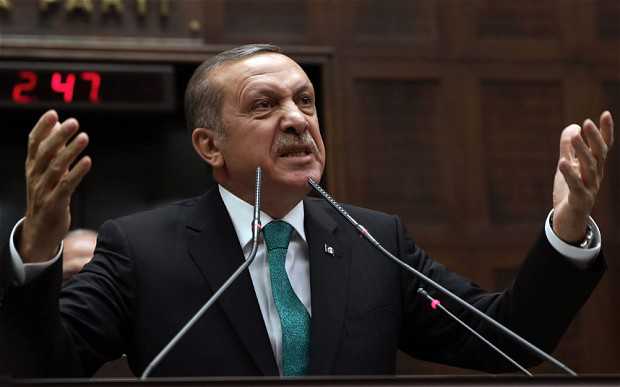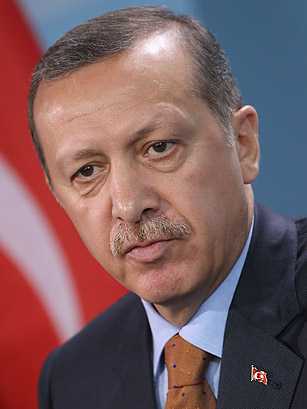
Turkey’s Prime Minister Tayyip Erdogan (3rd row centre) stands next to Justice and Development Party (AKP) members during a meeting at the party headquarters in Ankara in September.
ADEM ALTAN/AFP/GETTY IMAGES
By Mitch Potter Washington Bureau
ISTANBUL—It’s a broken world out there and today, more than ever, Turkey is offering itself as the glue to make everything right again.
Need a new boss in the buckling Middle East? Been-there, done-that, for 500 years. See Ottoman Empire.
Need a modernist model to whip the revolutions of Tunisia, Egypt, Libya toward just the right blend of democracy, Islam and prosperity? Hey, that’s us.
Need someone to deliver tough love to Syria, Iran and Israel, all at the same time? We can do that, too. We’ve got the second-largest army in NATO, after the U.S. We play nice. We can even talk to Pakistan. And when we talk, they listen. Need a bridge between east and west that brings both halves together in harmony? Apply here. Good terms available.
Such are the superficial slogans of the neo-Ottomans, whose sultan — three-term Prime Minister Recep Tayyip Erdogan — is flexing political muscle unmatched since the days of Kemal Ataturk, who founded modern Turkey from the ashes of empire nearly a century ago.
Erdogan’s Turkey has reasons to preen. It can look to withering neighbour and longtime rival Greece with something approximating pity, whispering, “But for the grace of Allah.”
Like Greece, Turkey jumped through a frenzy of market-reform hoops demanded by Europe during its decades-long accession dance, tripling its GDP in the process. But the coveted EU membership never came, and now resurgent Turkey is laughing all the way to the bank. Which happens to be bursting with Turkish lira, not ticking-bomb Euros, thank you very much.
Turkey got the milk, economists will say, without actually buying the cow, thanks to a customs union with Europe that drives as much as 80 per cent of Turkish exports.
Look at any washer or dryer on the continent, for example, and chances are it is Turkish-made — an industrial boom that has lifted many of its 70 million inhabitants from a low-tech textile and tea-growing past.
You can feel the rising confidence on the exotic streets of Istanbul, where explosive sprawl means something close to 17 million people now reside in a megacity straddling two continents.
But more than anything you can see it in Erdogan himself. This summer, the prime minister, head of the Islamic-inspired Justice and Development Party (AKP), ended years of intrigue by imposing full civilian control over Turkey’s fiercely secular military elite. Four times between 1960 and 1997, Turkish generals toppled their governments. It appears now the era of coups is over.
But in September, it was Erdogan’s “victory tour” of Tunis, Tripoli and Cairo that raised the most eyebrows in these parts — uninvited, the Turkish leader imposed himself on the seats of the Arab Spring’s new rulers, offering advice and encouragement. Egypt’s Muslim Brotherhood was especially piqued when Erdogan urged a secular separation of mosque and state as the way forward — and many Turks weren’t very amused either, given the absence of such a message on home turf.
Indeed, Turks themselves are as riven as ever with objections to Erdogan’s regional wanderings. They may be doing well, economically, but among the conspiracy-minded electorate there are many who doubt the AKP’s commitment to democracy, let alone the separation of religion and government that was laid down as Ataturk’s cardinal tenet for Turkish governance.
For evidence, most critics look no further than the country’s jails, where hundreds of retired and active military officers, journalists and political dissidents have been gathering dust, many accused of conspiring against the government in alleged coup plots known as Ergenekon and Sledgehammer.
“You have journalists labeled as terrorists because they dared criticize the AKP. And they’re talking about democracy? That’s been under siege here since 2003 (when Erdogan was first elected),” said Buket Sahin, an Istanbul-based writer/photographer and contributor to the country’s oldest daily, Cumhuriyet (Republic).
“Now Ergodan speaks as if he owns the country, just like a neo-sultan. The ones who were not put in jail were effectively bought, including many of my friends, and the result is silence as Turkey slides toward Islam and away from the secular society.
“I consider myself a daughter of Ataturk. He was the one who gave rights to women and ended the Sharia laws of the Ottoman era. Turkey didn’t need a new model because we already had the best one. And that’s at risk now.”
Some Turkish observers take a more tempered view, noting that dogma cuts both ways and even under the sway of its secular military elite Turkey was more autocratic than democratic.
British-born political analyst Gareth Jenkins, a resident of Istanbul since 1989, observes “secular space is shrinking” in Erdogan’s Turkey. From successive tax hikes on alcohol and cigarettes to the removal of barriers on expressions of Sunni Muslim values and a dauntingly large number (8,000) of websites blocked by the government, the AKP regime demonstrated a vision of the “more explicitly conservative society.”
One recent example: the Istanbul district of Beyoglu, a hub of revelry in a city that never sleeps, was raided repeatedly late in the summer with police teams stripping the district of its outdoor patio tables. District officials cited safety concerns, saying the unauthorized outdoor beer parlours had sprawled so completely across the narrow streets as to make the passage of an ambulance impossible.
The crackdown spawned a wild range of rumours — all false — blaming Erdogan himself. One version claims that the prime minister was offended by the sight of so much booze during a walk through the district on the eve of Ramadan. Another holds that a foolish reveler taunted Erdogan by toasting him with a tall glass of Efes beer as he strode past.
“None of the rumours about Erdogan being here are true. And the tables were removed long before Ramadan. But that’s Istanbul for you,” said Molly Farquharson, an expat Canadian and proprietor of Molly’s Café in nearby Galata.
“Still, the way it was done was very rude and ugly. In some cases, the police just told tourists to stand up as they sat there enjoying a drink. They seized tables right out from under people. And the result is about 2,000 service industry staff are jobless now.”
Jenkins said the patio table scandal is but one example in a growing list of AKP-inspired restrictions aimed at “the common demon.
“There is no great desire in the AKP party for sharia law. Their main aim is not an Islamic state but rather, a more Islamic society. So things like chairs and tables were removed — all right, now the ambulances can get through — but at the same time these things always coincide with something the AKP sees as offensive to their values. That’s why you will only see them pick on restaurants that serve alcohol.”
Mehmet Demirhan, a broadcast executive with Turkey’s Kanal 7, suggests Turkey’s shift toward conservative family values is more a consequence of the rise of a new electorate from the once-impoverished Anatolian heartland, the AKP’s political base.
“The Kemalists think it’s a religious thing — but it’s actually the opposite. It’s about class,” Demirhan said.
“As Turkey develops, we’re seeing the development of a new class of Anatolian people gaining affluence as they move to the urban centres. They’re becoming wealthier and more refined — but they are still traditionally conservative in their outlook. And they have the energy and the momentum in Turkey now.
“The secular elite doesn’t like it. But I expect time will heal those tensions. Give it another generation and their kids will all get along better than the parents.”
With Turkish democracy still very much a work-in-progress, few feel comfortable speaking openly, in Turkish at least, about this riddle of contractions, lest they fall afoul of dreaded penal code Article 301, which has been used to prosecute journalists for “insulting Turkishness.”
But it’s a different matter in English, which is why some of the most bristling domestic commentary today comes from such outlets as the English daily Hurriyet, where columnist Burak Bekdil last month mocked the “political schizophrenia” of Erdogan’s regional ambitions. From befriending the likes of Libya’s Moammar Gadhafi and Syria’s Bashar Assad, only to quickly turn on both, Turkey’s outreach has approached comic dimensions, he wrote.
“Turkey is a man who thinks he is a plumber, firefighter, Superman, Spiderman, Batman, sultan and everyone else” in the region, said Bekdil. “But sadly, at the end of the day, he looks like a comic figure from the circus.”
Jenkins agrees: “There is extraordinary hubris at play with Erdogan, in part because he is surrounded by terrified yes-men. To actually go to Libya and say, ‘We liberated you’ — and this from a guy who was the last recipient of the Gadhafi Human Rights Award (a dubious honour) — is astonishing.
“There’s a lot of self-aggrandizement in what he and the AKP say, all informed by the rhetoric of Ottoman nostalgia. Their vision is really to be a regional leader in a neo-Ottoman sphere.”
But the irony, said Jenkins, is that if Turkey were only to scale back its ambitions a few notches, “they would have a huge amount to offer.”
“What the Middle East needs is partnership, not leadership. But Turkey isn’t looking for partnership so much as hegemony. And that’s what is so frustrating about this moment. It calls out for Turkey’s strong, though not perfect, track record of parliamentary elections rather than Erdogan’s irascible personality.”
Kanal 7’s Demirhan, meanwhile, notes that in the context of the growing global economic and political unrest, Turkey at least deserves a chance to play out its hand on the world stage.
“The whole world can see the system is broken, from the Wall Street protests to the financial wreckage in Europe. Everyone’s looking for something else, some new basis for sharing the world’s wealth.
“For almost a century, Turkey turned its back on the East and looked only to the West. And now it realizes it can look both ways. So let us find out. If Turkey can do so with the Abrahamic spirit of a table where all are welcome, let it happen.”





 “The Syrian regime must change, or it will be changed” Thus Fa*ted Khalid Amayreh from the land occupied by Dayton’s army on behalf of “Nazi Like” Israel.
“The Syrian regime must change, or it will be changed” Thus Fa*ted Khalid Amayreh from the land occupied by Dayton’s army on behalf of “Nazi Like” Israel.
